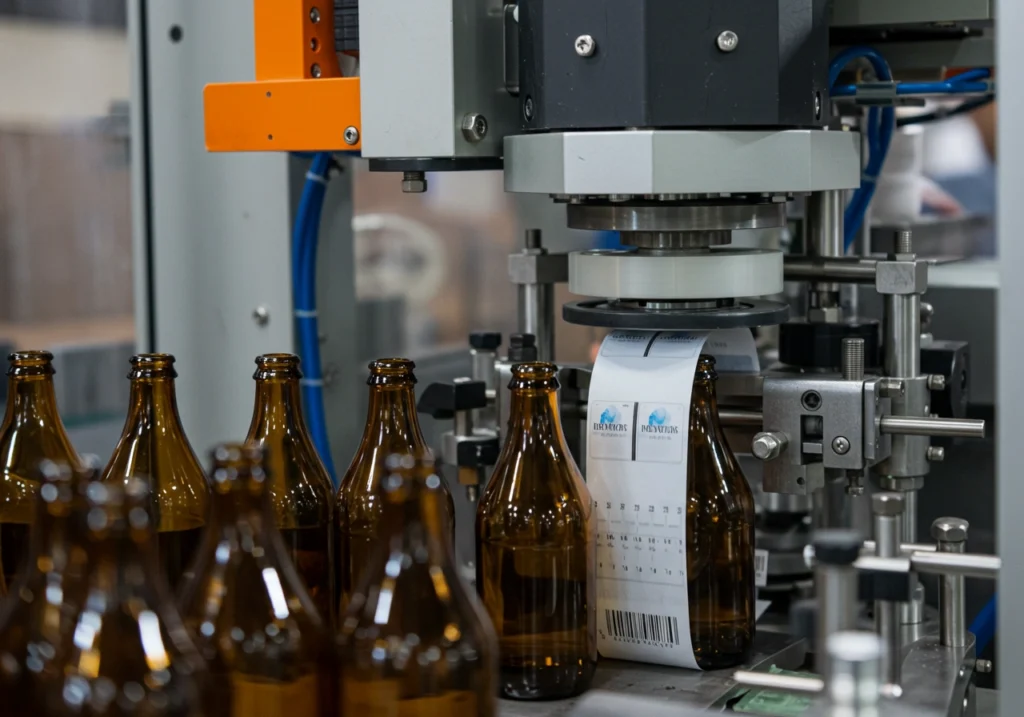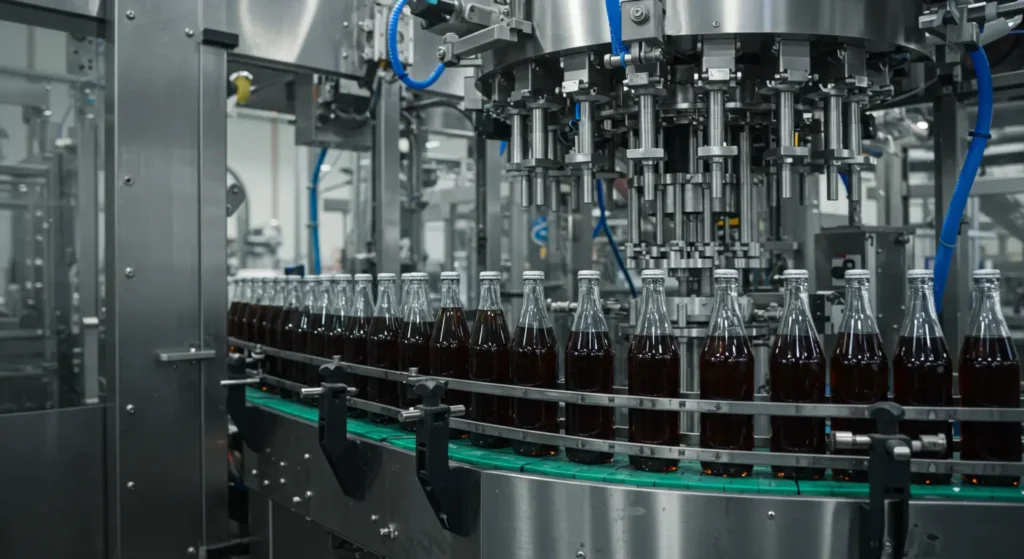Launching a private label beverage requires more than just a great recipe. The quality of your labelling and packaging can make or break the shelf appeal and customer trust.
Missed details in label application can cause costly delays, compliance issues, and wasted product.
Navigating the complex mix of regulations, design demands, and high-speed production means partnering with technology that delivers precision and consistency every time.
The right labeling machines not only enhance your brand image but also streamline your manufacturing process for faster, more reliable production runs.
At Interpack Technologies, we specialize in providing cutting-edge labeling solutions designed to meet the unique challenges of food and beverage manufacturers.
Our automated sticker labeling machines bring accuracy, speed, and efficiency to every bottle and package, helping your products stand out and succeed on the shelves.
Our machines are built to match India’s demands while delivering global quality, so your beverage stands out every time.
Understanding Private Label Beverages
Key concepts of private labelling in beverages
The shelf doesn’t lie. Whether it’s a chilled juice bottle or a herbal energy drink, many of these aren’t owned by big names. They’re private-label products, explicitly made by retailers or smaller companies that outsource manufacturing.
Unlike white label drinks, which are generic and sold to multiple brands, private-label beverages are exclusive. You control the recipe, label, and brand. You’ll find flavoured water, herbal teas, energy drinks, and even vitamin-enriched juices under this model.
Market potential and consumer behaviours in India
Walk through any supermarket in India, and you’ll spot a growing range of drinks with newer labels you haven’t heard before. That’s demand talking. Indian consumers are now more health-conscious, seeking low-sugar, plant-based, and functional beverages.
Online platforms like Flipkart and Amazon have made selling easier. Brands are finding value in launching D2C wellness beverages or niche functional drinks under their own label. From immunity boosters to cold brew coffee, private label drinks are making waves.
Benefits and Challenges of Private Label Beverages
Benefits of Private Label Beverages

Private label beverages often offer better profit margins than national brands since you negotiate directly with manufacturers. Eliminating middlemen reduces costs, allowing competitive pricing while maintaining higher profits.

Creating private-label beverages lets you customize formulations, packaging, and flavours to reflect your brand identity. This control helps you stand out in a crowded market and build stronger customer loyalty.

Private labels allow quick adaptation to changing consumer preferences and market trends. This flexibility lets you launch new flavours or adjust product lines swiftly to meet current demands.
Challenges of Private Label Beverages

Ensuring consistent product quality is vital as your brand depends on it. Private label beverages require strict oversight and collaboration with trusted manufacturers to maintain safety and standards.

Navigating complex food and beverage regulations can be challenging. Compliance with labelling, safety, and ingredient standards demands expert knowledge and careful attention to avoid costly issues.

Managing supply chain logistics and production scale can be complex, especially when demand skyrockets. Effective planning and reliable manufacturer partnerships are essential to prevent disruptions.
Cost and Investment Considerations
Understanding various cost components
Costing for private label drinks starts long before the first bottle rolls out. You’ll first spend on market research and product trials. Experimenting with natural colours or ayurvedic extracts isn’t cheap.
Co-packers or manufacturing partners charge based on order volume, container type, and production speed. Then comes packaging – bottle shapes, labels, tamper-proof seals, and barcodes – all drive up initial costs.
Estimating return on investment
Profitability in private label beverages rests on smart volume planning and pricing. While margins are higher, the return often starts showing after consistent batches move through shelves.
Successful players forecast demand, calculate break-even points, and position their drinks to meet consumer price expectations. Compared to branded products, private labels allow more freedom in pricing strategy, helping improve ROI when scaled efficiently.
Research, Formulation and Development
Conducting thorough market and competitive research
You can’t launch a drink that no one wants – or worse, already exists in five flavours. Start by identifying gaps. Maybe urban youth want energy drinks without caffeine or mothers prefer low-sugar fruit coolers for kids.
Study what competitors are getting right and where they’re failing. Look locally and globally to observe trends like kombucha, cold-pressed juices, or sugar replacements with stevia.
Beverage formulation process
This is where flavours, texture, and function come alive. Choose ingredients that suit your drink’s purpose – be it aloe vera for digestion or herbs for stress relief.
Decide whether it will be still, fizzy, fortified or classic. Every element must balance taste and shelf life. Ensure your drink contains safe additives or natural preservatives with clear nutritional value.
Choosing the Right Manufacturing Partner

Evaluating manufacturer capabilities
A promising drink idea can fall flat without capable execution. Choose a manufacturing partner who can scale with you – one who handles both small batches and higher orders as demand picks up.
Some offer turnkey solutions (from label to cap), while others allow you to bring your own recipes. Having in-house R&D support is also useful, especially when tweaking taste after initial feedback.
Key selection criteria
Look for partners with success in similar beverage formats. Whether it’s cold brew or yoghurt drinks, experience counts. Also, ask about their certifications, like FSSAI clearance or ISO ratings.
Beyond the factory floor, what’s their client track record? Can they meet deadlines and maintain hygiene? Reputation and consistency should steer your decision.
Design, Branding, and Positioning
Product branding and identity
Your drink might be delicious, but does it look inviting? Start by crafting a brand story that resonates with your audience, whether it’s youthful energy or healing traditions.
Then design the packaging. Choose PET, glass, or cans based on your theme. Think colours, font styles, foil seals and finally legal elements like barcodes and trademarks.
Strategic product positioning
How you price and sell determines the brand perception. Will your drink sit in premium shelves or go mass-market? That affects pricing strategy and packaging flair.
Target demographics also matter. A post-gym recovery smoothie requires a distinct branding approach compared to a kids’ summer cooler. Make the design speak clearly with benefits and uniqueness front and centre.
Regulatory Compliance and Quality Assurance
Compliance with Indian food and beverage laws
Each bottle that hits the market must comply with food safety guidelines. Get your FSSAI licence sorted and ensure your labels include correct ingredient lists and nutritional values.
Layout and barcode placement follow specific guidelines, especially if selling in retail stores or e-commerce platforms. Keep documents updated before production begins
Implementing quality control systems
Product safety is non-negotiable. Implement stringent testing from production to shelf. Use batch testing to check quality and shelf life.
Audit your vendors periodically to ensure raw materials stay consistent. Every machine must follow hygiene protocols and meet the desired output without glitches.
Marketing and Distribution Strategy
Crafting marketing strategies
Consumers don’t just buy drinks – they buy stories and benefits. Use catchy social media campaigns or engage influencers who match your drink’s vibe.
Offline strategies like point-of-sale displays and in-store offers also help. Pick seasons wisely – summer is perfect for coolers and winter for health elixirs.
Reaching the intended consumer
Distribution is more than logistics. Where your drink lands affects who picks it up. High-value nutrition drinks work on D2C channels, while soda replacements fit well in retail.
Choose marketplaces like Amazon or local chains accordingly. Maintain branding consistency across platforms to help customers recognise and trust your product.
Legal and Business Considerations
Agreements and legal decisions
Legal clarity keeps your business safe. Draw up NDAs with partners, sign clear terms on pricing and delivery timelines. Ensure recipe ownership is clearly documented.
Supply chain hiccups happen – have legal clauses ready to handle disruptions without stalling your business or harming the brand.
Ethical and sustainability aspects
Sourcing matters. Customers do care about how ingredients are farmed or sourced. Choose materials that meet environmental standards where possible.
Keep labelling clean and ethical. Claim only what your drink delivers. Pay fair wages and ensure every part of your production respects human dignity.
Packaging and Shelf Life Management

Packaging decisions and formats
Looks attract – but the pack must also protect. Choose between PET bottles, glass, cans and even compostable containers depending on the target market and shelf life.
Consider ease-of-use with functional features like resealable caps and tamper-evident bands. Ensure label adhesives and seals can endure varied climates during transit across India.
Shelf life optimisation
To keep your drink fresh till the very last gulp, plan for temperature stability. Pasteurisation helps, but so do mild preservatives and antioxidants.
Storage needs to be humidity-controlled and indexed for FIFO systems. Invest in secondary packaging, such as cartons or trays, to add protection during long hauls.
Frequently Asked Questions
Are private-label beverages legal in India?
Yes, they are legal as long as you obtain the necessary approvals, such as FSSAI, and follow packaging rules.
Can alcoholic and non-alcoholic variants be sold as private label?
Yes, both are allowed. Alcoholic ones need extra licenses based on state laws. Non-alcoholic products follow FSSAI norms.
What trends are dominating drink marketing?
People are picking up functional drinks like vitamin-infused water, caffeine-free energy drinks, or probiotic-based beverages.
Can someone start a private label with low funds?
Start with small batches and semi-automatic machines. Our semi-auto bottle labellers are perfect for such low-investment launches.
How do barcodes help private labels?
Barcodes help private labels by improving accuracy and efficiency in tracking products throughout the supply chain. They enable real-time inventory management, reducing errors and ensuring timely restocking.
